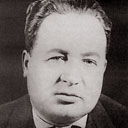The directory ЂPlotsї
Chorny („орны) Kuzma (real name Mikalai Ramanouski)
(1900Ч1944)

Kuzma Chorny, prose writer, playwright and publicist, was born into a peasant family in the Minsk region. In 1916 he entered Niasvizh Teachers' Seminary. Unfortunately he was not able to finish his study there because the seminary was closed down by Polish authorities in 1919. In 1923 he entered Belarusian State University (pedagogical faculty, literary department) and joined the literary association Maladniak. In 1926-31 Chorny presided over the literary association Uzvyshsha and in 1932-37 he was a literary supervisor consultant for young authors at the Belarusian Writers Union. In October 1938 he was arrested under false pretence and had to spend 8 months in prison, six of them in a solitary cell. Since their were no grounds on which the charges were made, Chorny was set free in June 1939. In 1941 - 44 he was evacuated and lived mostly in Moscow, after which he returned to Minsk. He died in Minsk, shortly after his return, due to diseases brought on by the tortures he suffered in prison and the malnutrition he suffered during the evacuation. His first article and poems were published in 1920 and first two books appeared in 1925. Chorny's early stories are written as novellas and show the spiritual revival of a person who comes from the lower strata of society. His style undergoes significant changes in the mid 1920s acquiring deeper psychological character. Maturity of style and philosophical approach are vividly observed in his long novels Sister, Land, Motherland, etc. Chorny was the first in Belarusian literature to equate Fascism with Stalinism - a theme later developed by V. Bykau. Chorny translated into Belarusian the famous works of Russian classics such as Pushkin, Gogol, Ostrovsky, Gorky and others. His works were translated into many languages and some of them were adapted into films.
Belarus, 2000.06.24,  Minsk. Kuzma Chorny
Minsk. Kuzma Chorny
Belarus, 2000,  Kuzma Chorny
Kuzma Chorny